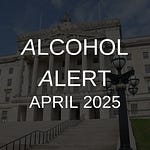Hello and welcome to the Alcohol Alert, brought to you by The Institute of Alcohol Studies.
In this edition:
Chancellor announces a blanket freeze on alcohol duties for a second consecutive year in the spring Budget 🎵 Podcast feature 🎵
Irish data highlights ways in which the pandemic has slowed progress in tackling alcohol misuse
Research finds association between alcohol-related violence and deprivation, amplified by the availability of alcohol 🎵 Podcast feature 🎵
Doctors in Scotland urge ministers to break sponsorship link between alcohol and sport
We hope you enjoy our roundup of stories below: please feel free to share. Thank you.
Budget 2021: Duties for alcohol kept on ice
🎵 Podcast feature 🎵
All alcohol duties were frozen for the second year in a row in the 2021 Budget, marking the eighth year out of the last nine that alcohol duties have failed to keep up with inflation (03 Mar).
According to the Office for Budget Responsibility’s costings, the freeze in alcohol duties – a cut, in real terms – are estimated to cost roughly £1·7bn to the year 2025/26.
Chancellor of the Exchequer Rishi Sunak's statement came ahead of the government's much anticipated response to the alcohol duty review consultation held late last year.
Responding to the announcement, IAS Chief Executive Katherine Severi said:
It is disappointing that the Chancellor has chosen to freeze alcohol duty today, which represents a cut in real terms. This will do nothing to help the thousands of families across the country whose lives are blighted by alcohol, an issue which has become even more acute during the pandemic.
We need to rethink how alcohol is taxed to ensure public health is always given priority over alcohol industry profits. Raising alcohol duty can generate vital public funds to support the NHS and social care services and the public are largely supportive of this policy.
The ongoing alcohol duty review is a once-in-a-generation opportunity to improve a broken system which promotes cheap, strong alcohol that wrecks lives and burdens our NHS and public services. We will continue to work with government to propose a fairer system that produces net gains for society, not just supermarket profits.
A good pandemic for HM Treasury?
One reason for Rishi Sunak’s decision to freeze all alcohol duties for another year may lie in the increased revenue from heavier drinking during the COVID-19 pandemic. According to the Office for Budget Responsibility (OBR), HM Treasury stand to rake in £800 million more than predicted for the financial year 2020/21. This makes alcohol duties ‘one of the few tax streams that has outperformed our pre-virus forecast’, as ‘higher sales in supermarkets and other shops have more than offset the loss in receipts from the closures of pubs and restaurants for large parts of the year’.
In an article for Alcohol Change UK, alcohol policy modeller Colin Angus suggested that ‘persistently freezing duties changes public perception, encouraging the idea that duty freezes for alcohol are the norm, making it politically more difficult for the Chancellor to increase duties in line with inflation in future years’. You can hear Colin Angus describe this issue in more detail on the podcast.
Despite a real terms cut in alcohol duties, some sectors of the industry were left dissatisfied by the Budget, with Society of Independent Brewers chief executive James Calder claiming that it ‘does nothing for independent breweries’ and others believing that approach to beer duty ‘could have been bolder’ (Morning Advertiser, 05 Mar).
Yet, this has still not stopped the ‘deluge’ of bookings made for when pubs reopen for outdoor service from 21 April (BBC News Business, 05 Mar), indicating that not only does a pent-up demand exist regardless of the Chancellor’s proclamations on duties, but also that businesses in the hospitality sector could have benefitted from fiscal measures more closely linked to their day-to-day costs, such as rents and business rates.
The Budget also neglected to mention any policies to deal with the looming public health crisis in alcohol-related morbidity, as was warned about days before (British Medical Journal, 01 Mar):
We are already at crisis point, with the most recent Global Drugs Survey revealing that the UK rate of hospital admissions because of alcohol was higher than among users of any other drug cited in the report apart from heroin and with more than 5% of people under 25 in the UK reporting having sought hospital treatment after getting drunk.
Subsequently, a host of public health experts, led by the Alcohol Health Alliance, expressed their disappointment at the duty freeze in the Times (09 Mar). But they did reserve hope for the outcome of a government review to be conducted later this year:
… providing an opportunity to overhaul an inconsistent system causing alcohol harm. As a result of the present system it is possible to drink the low-risk weekly guideline of 14 units for just £2·68 in England — about the price of a high-street cup of coffee. This is causing immeasurable damage.
The government must create a scaled alcohol duty structure that ensures the strongest products are taxed the most to encourage drinkers to move away from purchasing the most dangerous drinks. With 80 people across the UK dying from an alcohol-related cause every day, we need urgent action to tackle this crisis.
Ireland – pandemic slows progress on alcohol misuse
New research findings have shown that while there have been declines in some sections of society regarding Irish drinking habits, the onset of COVID-19 has threatened to reverse them in others.
A report titled Health Behaviours, Health Outcomes and Contextual Factors between 1998-2018 found that rates of alcohol use among school-aged children ‘significantly decreased since 1998’ (Irish Times, 08 Mar).
Led by senior researcher Aoife Gavin in collaboration with the HBSC research team at the Health Promotion Research Centre in NUI Galway, the study comprised of a sample of 15,557 pupils aged 10 to 17 years from 255 primary and post-primary schools across Ireland, and found a 14 percentage point drop in respondents reporting having ever been drunk over the 20-year period (33% in 1998 vs 19% in 2018).
However, the pandemic has led to the dominance of home drinking, which has in turn exacerbated the problem of alcohol’s accessibility to underage drinkers. Reports that on-demand alcohol delivery ‘skyrocketed’ during lockdown ‘with no checks’ on serving children caused Teachtaí Dála (TDs) to call on Justice Minister Helen McEntee to introduce restrictions on delivery services (Irish Sun, 14 Mar).
Overall alcohol tax receipts data in Ireland showed a 2·4% decline, suggesting a drop in annual consumption of 6% in 2020, meaning that the country’s public finances ‘experienced little impact’ of the pandemic (Irish Times, 11 Mar). And within the alcohol category, there were significant fluctuations among particular beverages: while excise receipts from beer sales fell 17%, and 11% for cider, wine consumption rose 12% in 2020 ‘even though many restaurants where it would frequently be consumed were closed for a considerable portion of the year’, indicating a sharp year-on-year increase in the number of people drinking wine at home.
Alcohol Action Ireland (AAI) expressed their disappointment with the figures, with head of communications and advocacy Eunan McKinney remarking that they highlight ‘the extraordinary shift that has taken place among Ireland’s drinking population and the ocean of alcohol that has poured into the nation’s homes.’
Feighan: Ireland to implement MUP with or without the north
Given the urgency of the problem identified by AAI, the Irish government is considering implementing minimum unit pricing, under the 2018 Public Health (Alcohol) Act, asynchronously from its neighbour, Northern Ireland. Frank Feighan, the junior minister for public health, explained that the Oireachtas could ‘not wait any longer for Northern Ireland’ to protect problem drinkers, after their health minister, Robin Swann, elected to defer minimum unit pricing until after the next Stormont assembly elections in May 2022 (The Times (paywalled), 15 Mar).
Swann told the assembly: ‘I do not think that we have the scope in [the current assembly term], by way of capacity in my department or the time that is necessary to bring it forward in a meaningful way, but I intend to put it to consultation so that the preparatory work is done for whomever comes into this role in the next mandate.’
In response to this development, Feighan said: ‘I will be recommending to government that we have to move. I have talked to minister [for health] Donnelly and I understand he has spoken with the Taoiseach, and I have talked to the Tánaiste. I think it will be discussed in the coming weeks as to what the best way forward would be, and that will be a matter for cabinet. Unfortunately, there may be unintended consequences around excise duties… it would have been ideal to move with Northern Ireland but we cannot wait any longer. I would like to have a short consultation with stakeholders like publicans and off-licences, and then to move with the legislation we have.’
AAI said it recognised some consultation may be required to refine the logistics and timing of the measures ‘but we trust that the Taoiseach, Tánaiste and the leader of the Green Party will expedite matters over the coming weeks and that operation will commence in early autumn’.
Alcohol-related violence and deprivation
🎵 Podcast feature 🎵
This week, Lucy Bryant and Dr Carly Lightowlers presented their research on alcohol-related violence and deprivation to an audience at the Scottish Health Action on Alcohol Problems (SHAAP) and Scottish Alcohol Research Network (SARN) Alcohol Occasionals sessions. Between them, the researchers shared findings suggesting that those in the lowest socioeconomic groups experience disproportionate rates of alcohol-related violence and that increases in alcohol availability and deprivation, when seen together, increase the rates of such violence to a greater degree than when either of these factors appears alone.
You can listen to Dr Lightowlers explain the research in more detail in our podcast, and you can also watch the presentation in full on SHAAP’s website.
In other research
Alcohol pricing policies such as duty increases and minimum unit pricing appear to target men’s drinking habits more effectively than women’s, according to a new study published in Addiction (02 Mar).
Researchers found that each of the three policies modelled – a 10% duty increase, and minimum unit prices (MUP) of £0·50 and £0·70 per UK unit – would lead to larger estimated reductions in consumption and hospital admission rates among men than women. The authors also showed how this is driven by gender differences in alcohol consumption, purchasing patterns and harm among adult drinkers in England, leading women’s spending to increase more than men’s. At full effect – that is, once consumption changes have worked their way through to health outcomes - a £0·50 MUP is expected to lead to a sevenfold larger reduction in consumption and a three times larger reduction in hospital admissions for men compared to women.
The level and frequency of alcohol consumption rose among drinkers in the UK during lockdown, according to University College London researchers published in the Drug and Alcohol Review journal (03 Mar). Surveying a self-selected sample of nearly 3,000 participants between 30 April and 14 June 2020, they found that 30% of participants reported drinking more frequently in lockdown, with 16% reporting drinking more units per drinking occasion and 14% reporting more frequent heavy episodic drinking. They also found that ‘deterioration in psychological wellbeing was consistently associated with increased frequency of drinking’.
The first UK COVID-19 lockdown saw a “rapid and sustained” fall in violence outside the home in the Welsh capital city, a new study led by Cardiff University has shown (Journal of the American Medical Association, 05 Mar).
A research team from Cardiff University’s Crime and Security Research Institute (CSRI) and the US Centers for Disease Control and Prevention studied data from Cardiff’s sole emergency department (ED) from March to June 2020, comparing it to weekly data from January 2019 onwards, and found almost 60% fewer attendances per week for violent injury outside the home in the first lockdown. Lead author professor Jonathan Shepherd, from the CSRI, said: ‘This sudden fall in violent injury is the largest any of us has ever seen. It’s likely to reflect closure of city centre pubs and clubs in and around which most violence takes place, and widespread compliance with lockdown restrictions.’ Regarding violence in the home, no significant change was found in any category, which professor Shepherd said was ‘reassuring’.
The amount of alcohol consumed during a given drinking occasion is strongly associated with the duration of the occasion combined with the beverage type and serving size, according to a study reported in Alcoholism: Clinical & Experimental Research (05 Mar). Researchers from the University of Sheffield, UK, analysed data from over 18,000 adult drinkers in Great Britain who wrote a seven-day retrospective drinking diary and between them recorded the characteristics of over 46,000 drinking occasions, with the aim of identifying which features – and combinations of features – are most predictive of the units of alcohol consumed during drinking occasions in Great Britain.
They found that longer occasion duration, drinking spirits as doubles, and drinking wine were the strongest predictors of heavy alcohol consumption, and that the strongest predictors of longer drinking occasions were drinking in both on-trade venues (eg pubs) and off-trade (eg at home), starting earlier in the day, and drinking with friends.

A review of the latest evidence and research on liver disease, authored by over 30 leading hepatology consultants and senior figures from the Foundation for Liver Research, British Liver Trust and Public Health England, has found that almost a quarter of patients (24%) admitted to hospital with liver disease die within 60 days (The Lancet, 11 Mar). These patients have not been previously diagnosed and are admitted as an emergency. The report also observes that people with advanced liver disease admitted to hospital as an emergency, are seven to eight times more likely to die than those admitted with a stroke or heart attack.
Updated estimates of population level alcohol consumption undertaken in collaboration with the University of Glasgow, have found an estimated net effect of minimum unit pricing (MUP) of -3·5% in off-trade alcohol sales per adult in the year following its implementation in Scotland in 2018 (Public Health Scotland, 16 Mar).
Whilst slightly lower than previously reported, both the estimated net effect of MUP and the observed impact of MUP on different drink categories are comparable with the original findings, and the overall estimate for Scotland in 2019 remains at 9·9 litres of pure alcohol per adult, equivalent to 19·1 units of alcohol per adult per week and the lowest level of pure alcohol sold in Scotland since 1994.
Sainsbury’s are the most likely of the major supermarkets to push online shoppers in Scotland towards alcohol, according to campaign group Obesity Action Scotland (17 Mar). Their report found that overall, customers are bombarded by around 500 promotions during the average online grocery shop, with around a tenth (11%) of all promotions for alcohol. Sainsbury’s was the worst offender, hosting the most alcohol promotions as a proportion of all food and drink promotions for both healthy (basket 1) and standard (basket 2) shopping trips.
Doctors urge ministers to break sponsorship between alcohol and sport in Scotland
Doctors have renewed calls for Scottish ministers to break links between alcohol and sport with a clampdown on lucrative sponsorship deals, after an alcohol producer declared its support for Scotland’s national football team (The Times, paywalled, 28 Mar).
Alcohol policy campaigners Scottish Health Action on Alcohol Problems (SHAAP) said children were especially susceptible to advertising and called for robust restrictions to be considered by the next Scottish government after May’s Holyrood elections.
Recent events have exposed a sharp divide between sporting associations that embrace the backing of alcohol producers and those who spurn it: earlier in the month (22 Mar) Tennent’s Lager tweeted its continuing support for Scotland’s national football teams.


This stands in sharp contrast to Scottish Women’s Football, who struck up a sponsorship agreement with Scottish Health Action on Alcohol Problems (SHAAP) in March 2019.
‘It’s time for others to follow their lead and protect their fans and players,’ said SHAAP interim director, Lindsay Paterson. ‘Alcohol companies have large sums available for sponsorship and it is understandable but disappointing that Scotland’s national teams have accepted this sponsorship.’
In response, the Scottish FA said that Tennent’s was the ‘original supporter’ of Scottish football and had been an integral part of the game dating back to 1974. ‘Over the years they have made a positive impact at all levels of the sport, and we look forward to building on that together in the years to come,’ they said in a statement.
The UK Alcohol Alert (incorporating Alliance News) is designed and produced by The Institute of Alcohol Studies. Please click the image below to visit our website and find out more about us and what we do, or the ‘Contact us’ button. Thank you.

















